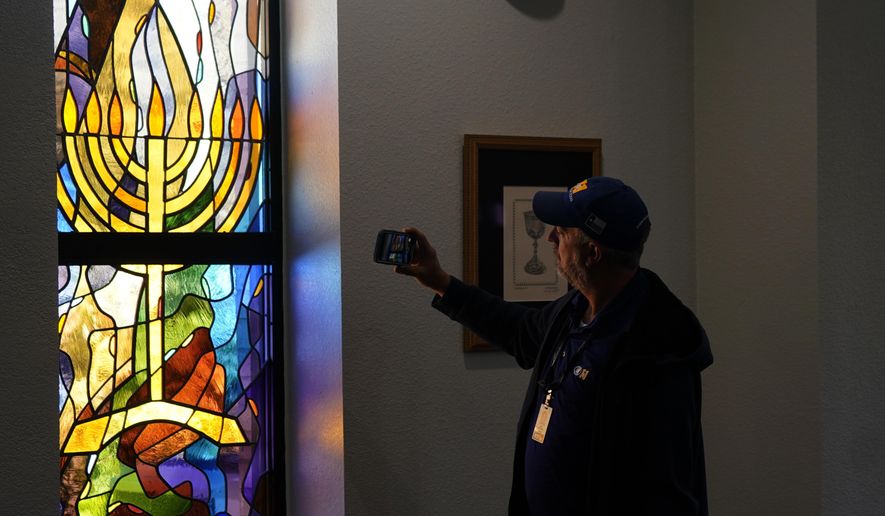Jews in the United States reported a 33% rise in fears about antisemitism during 2022, according to the American Jewish Committee’s annual report, released early Monday.
Last year, 41% of American Jews said their status in the United States is “less secure” than a year earlier, up from 31% a year earlier. The report, which marks the fourth annual survey on the subject, also found 48% of Jews and 34% of the general population believe antisemitism is taken less seriously than other forms of hate and bigotry.
An estimated 6 million Jews live in the United States, according to the WorldPopulationReview.com.
Online antisemitic content was seen by more than two-thirds of Jews, and 57% said they’d seen it more than once. The most antisemitic content was seen on Twitter (45%) and Facebook (43%). About 20% saw antisemitic messages on Instagram or YouTube, the AJC survey reported.
The survey, conducted in the fall by independent research firm SSRS for the Jewish group, caps a year when a hostage crisis engulfed a synagogue in Colleyville, Texas; a Jewish homeowner seeking to host prayer gatherings sued a Cleveland suburb for siccing private investigators on him; and the U.S. Air Force Academy scheduled a key training exercise on Yom Kippur, or Day of Atonement, the most sacred day in the Jewish religious calendar.
Nearly four in 10 U.S. Jews have changed their behavior for fear of antisemitic attacks, the survey indicated. They no longer wear a yarmulke (skullcap) or a Star of David in public, avoid certain places or events, and have stopped posting online content that “might identify them as Jewish,” the AJC announcement said. People who have personally experienced antisemitic attacks are twice as likely to have downplayed their Jewish identity, the group said.
Confidence in the responsiveness of law enforcement to antisemitic incidents is waning. Orthodox Jews surveyed were only 67% sure law enforcement “effectively addresses their needs,” down from 81% in 2021. Overall in the community, 65% of Jews say police and other agencies are responsive; 35% disagree.
“No Jew in the United States, especially the younger generation, should ever feel unsafe for expressing their Jewish identity. Yet rising antisemitism is having a deeply disturbing effect on American Jews and American society in general,” Ted Deutch, the organization’s CEO, said in a statement.
Along with a general unease about increased antisemitism in society, Jews on college campuses and in the workplace also expressed concerns over security and treatment by non-Jews.
Some 26% of those who attend college, those who’d attended during the past two years, or were parents of children in college said 18% were “uncomfortable or unsafe” at a campus event because of their Jewishness. Approximately 26% reported difficulty in taking time off to observe Jewish holy days, and 21% said they avoided wearing or carrying items that would identify them as Jewish.
In workplaces, one-third of those who said they were employed reported experiencing an antisemitic issue in the past year. Eight percent felt unsafe or uncomfortable at work because of their identity. Some 22% avoided expressing opinions about Israel, the report said.
The committee reported that 91% of U.S. adults said they believe antisemitism “is a problem for everyone and affects everyone as a whole,” the committee reported. Familiarity with the term “antisemitism” among the general population is at 69%, up 4 points from last year. And 68% of survey respondents said antisemitism is a problem in America, up from 60% the year before.
Knowledge about the National Socialist regime in Germany’s genocide against European Jews during World War II varies among the general population While 76% correctly placed the event between 1930 and 1950, only 53% knew that the Nazis and their collaborators murdered 6 million Jews. Another 20% said they were not sure of the number, while an average of 12% of respondents said the figure was either 3 million or more than 12 million.
According to the AJC, representative samples of 1,507 Jews, ages 18 or older, were interviewed by telephone and online from Sept. 28 to Nov. 3, as well as 1,004 adults in the general population, also age 18 or older, via the SSRS Opinion Panel, between Oct. 10 and Oct. 18. The group said the margin of error for Jewish respondents is plus or minus 3.4 percentage points and for total U.S. adult respondents is plus or minus 3.8 percentage points, each at the 95% confidence level.
• Mark A. Kellner can be reached at mkellner@washingtontimes.com.




Please read our comment policy before commenting.